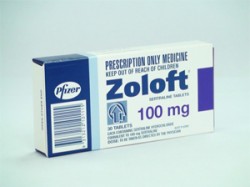Top Class Actions’s website and social media posts use affiliate links. If you make a purchase using such links, we may receive a commission, but it will not result in any additional charges to you. Please review our Affiliate Link Disclosure for more information.

After taking Zoloft throughout her pregnancy with her doctor’s OK, plaintiff Kelly Hardy gave birth to a baby boy on July 28, 1999. Shortly after the birth, doctors diagnosed the child with multiple birth defects, including patent ductus arteriosus (PDA), which is a defect that leaves an opening between two major blood vessels leading from the heart. If left untreated, the result is too much poorly oxygenated blood flowing through the heart and ultimately a weakened heart muscle. Heart failure and other complications can occur.
Additionally, the Zoloft lawsuit alleges that the child was also born with an intraventricular hemorrhage or bleeding into the fluid-filled areas (ventricles) inside the brain. Premature and low birth weight infants are at an increased risk for an intraventricular hemorrhage.
Zoloft (sertraline) is a member of the class of drugs known as selective serotonin reuptake inhibitors — SSRIs — and is used to treat depression, anxiety, panic disorder, obsessive-compulsive disorder, post-traumatic stress disorder, pre-menstrual syndrome and social anxiety. Other SSRIs include Lexapro, Celexa, Luvox, Prozac and Paxil.
Studies of SSRIs have demonstrated that women who took the drug late in pregnancy showed significantly higher rates of prematurity, poor neonatal adaption, low birth weight and length, and congenital defects, according to the Zoloft lawsuit, which accuses Pfizer of knowing those risks and concealing them.
Pfizer also knew doctors prescribed Zoloft to women of child-bearing age (the FDA has never approved its use in pregnant women) yet failed to disclose to the medical community and consumers of the potential risks, according to Hardy’s birth defects lawsuit.
Pfizer’s failure to inform was “willful, wanton and with intentional disregard to the health and safety of consumers, including Kelly Hardy, and caused serious and permanent injuries to the plaintiffs,” the Zoloft lawsuit reads.
There are some 250 Zoloft birth defect lawsuits pending in a Pennsylvania federal court, where the cases were consolidated in a multidistrict litigation (MDL). MDLs are meant to expedite the handling of complex cases that share common issues.
In 2011, eight couples — from Illinois, Indiana, Minnesota, Florida, Wisconsin, Texas and New York — filed Zoloft lawsuits against Pfizer alleging Zoloft caused various birth defects. All of the mothers took Zoloft while pregnant.
The birth defects included heart defects, neural tube defects, gastroschisis, omphalocele, craniosynostosis, cleft lip, club foot, anal atresia and limb reduction, according to the Zoloft lawsuit. The plaintiffs attribute the defects to the Zoloft they took while pregnant.
The couples accused Pfizer of marketing Zoloft as the safest anti-depressant on the market for expectant mothers, despite having knowledge of the risks.
“Pfizer’s sales force blitzed doctor’s offices with literature and verbal presentations designed to convince doctors and consumers that Zoloft was a superior drug for treatment of, among other things, depression during pregnancy,” the Zoloft lawsuit states.
“Pfizer aggressively promoted Zoloft as an improvement over other antidepressant drugs on the ground that Zoloft was less likely to cause side effects if taken during pregnancy,” it adds.
In 2010, GSK, the maker of Paxil, paid out more than $1 billion to settle birth defect lawsuits.
In general, birth defect lawsuits are filed individually by each plaintiff and are not class actions.
Do YOU have a legal claim? Fill out the form on this page now for a free, immediate, and confidential case evaluation. The attorneys who work with Top Class Actions will contact you if you qualify to let you know if an individual lawsuit or class action lawsuit is best for you. Hurry — statutes of limitations may apply.
ATTORNEY ADVERTISING
Top Class Actions is a Proud Member of the American Bar Association
LEGAL INFORMATION IS NOT LEGAL ADVICE
Top Class Actions Legal Statement
©2008 – 2024 Top Class Actions® LLC
Various Trademarks held by their respective owners
This website is not intended for viewing or usage by European Union citizens.
Get Help – It’s Free
Join a Free Birth Defect Class Action Lawsuit Investigation
If you or someone you know took an SSRI or SNRI antidepressant while pregnant and gave birth to a child with birth defects, legal options are available. See if you qualify by filling out the short form below.
A birth defect attorney will contact you if you qualify to discuss the details of your potential case at no charge to you.
Oops! We could not locate your form.












